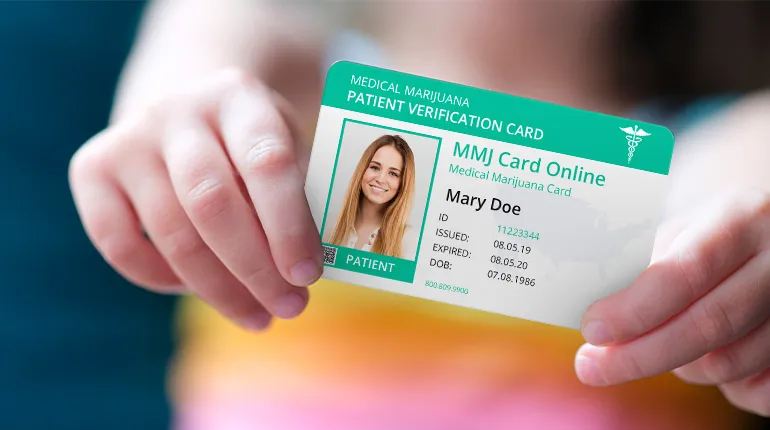Medical Marijuana Access for Minors: A Comprehensive Guide
The question “can a minor get a medical card for marijuana” is straightforward to answer. In most states with an MMJ program, minors (usually applicants aged 17 and under) can apply for medical marijuana. Typically, the process involves applying through the state’s MMJ portal and getting the permission of a parent or legal guardian who acts as the patient’s caregiver.
However, depending on the state, there are different requirements, and parents must also decide whether medical marijuana is a safe option for their child. This article outlines how minors can get medical weed, the caregiver role, and details of extra hoops you may need to jump through. It concludes by looking at the safety concerns surrounding the use of MMJ in minors.
What Is the Standard MMJ Age Requirement?
In the vast majority of American states with medical marijuana programs, the minimum age requirement is set at 18. However, there are exceptions. For instance, in Alabama, you must be aged 19+ to apply. In states with recreational marijuana, you can buy and possess a certain amount once you turn 21.

The other noteworthy requirements include being a state resident (in most cases) and having one of your state program’s qualifying medical conditions. If you meet these stipulations, the next step usually involves booking a consultation to see if you can get a doctor to provide written certification. This document lets you complete your state’s application process, usually online.
However, it is a very different scenario for minors, as the usual application process doesn’t apply. The state requests proof of age, so your application will be rejected if you don’t meet the minimum requirement. Fortunately, the door isn’t closed to minors.
How to Get a Medical Card for Minors
Due to concerns surrounding marijuana use in children and teenagers, additional steps are included when minors want to apply. The process usually is as follows
- Show proof of a qualifying medical condition: The minor must have a qualifying medical condition as specified by the state’s medical marijuana program. Common qualifying conditions may include epilepsy, cancer, chronic pain, multiple sclerosis, or other debilitating illnesses. However, in some states, there are fewer qualifying conditions for minors than for adults.
- Parental or guardian consent: A parent or legal guardian’s consent is required for a minor to apply for a medical marijuana card. This adult may need to sign the application forms and provide additional documentation, such as proof of guardianship.
- Physician’s recommendation: The minor’s healthcare provider must recommend medical marijuana treatment. This recommendation should outline the dosage, frequency, and form of medical marijuana appropriate for the minor’s condition.
- Application submission: The minor and their parent or legal guardian must complete and submit the necessary application forms to the appropriate state agency or program overseeing medical marijuana. The documents typically require personal information, medical records, and signatures. Most state programs have separate application forms for minors.
- Application fees: There may be application fees associated with obtaining a medical marijuana card. These fees vary by state and are typically paid during the application process. Some states offer fee waivers or reduced costs for minors or individuals with financial constraints.
- Review and approval: The submitted application will be reviewed by the state’s medical marijuana program. If the application ticks all the boxes and is approved, the minor will receive their medical marijuana card.
When applying for an MMJ card, it is necessary for the parent/legal guardian and the patient to include the following apart from the above:
- Photo ID for both parties
- The minor’s birth certificate
- Proof of address (usually within 90 days of the date of application)
- Two passport photos of the minor
Some States Have Additional Steps
While minors may have success by following the above information, it is often the case where the state program requests that applicants follow special procedures. For instance, applicants may need to produce two completed physician certification forms signed by doctors from two different practices.

In certain jurisdictions, only a licensed pediatrician is permitted to provide certification to minor MMJ patients. Also, the doctor must perform follow-up checks and monitor the patient’s progress.
The parent/legal guardian must also complete a document such as Michigan’s Declaration of Person Responsible Form. Furthermore, the adult must show proof of state residency.
Having a Caregiver Is Mandatory
Then there is the issue of the parent or legal guardian of the minor agreeing to act as their caregiver.
In most states, you can only become a caregiver if you’re a state resident aged 21+. Typically, a person will be barred from becoming a caregiver if they have a criminal record, particularly for felonies or drug-related crimes. Caregivers must be prepared to undergo background checks and complete separate application forms.
The number of caregivers a minor can have will vary depending on the location. For example, in Maryland, minor patients can have up to four caregivers, one of whom must be the patient’s parent or legal guardian.
The role of the caregiver involves overseeing the MMJ patient’s well-being. It involves many responsibilities, including buying the patient’s marijuana from the dispensary, storing it safely, and administering it when necessary.
In states where it is legal to cultivate marijuana in a private residence, caregivers may be permitted to grow a specific number of plants on behalf of their patients.
Finally, you should note that you may need to complete a certification course to become a caregiver in certain states.
Is It Safe for Minors to Use Medical Marijuana?
This is a highly controversial topic. There is evidence that MMJ could help alleviate certain conditions in children. However, some studies show concerning issues surrounding the brain development of minors who use marijuana regularly. Let’s analyze both sides so parents can see the pros and cons of allowing their children to access the substance.
The Dangers of MMJ In Children
There is undoubtedly plenty of alarmist anti-marijuana literature. Alex Berenson’s book: Tell Your Children: The Truth About Marijuana, Mental Illness, and Violence claims that marijuana causes psychosis, which in turn causes violence. In Berenson’s opinion, marijuana causes violence.
However, his tome was intensely criticized, with the author accused of modern-day Reefer Madness propaganda. Much of the book focuses on anecdotes and observations rather than correctly analyzing the available studies.

Nonetheless, it is incorrect to suggest that every suggestion that marijuana is harmful is based on similar biases. This is certainly the case regarding its impact on children. According to the American Academy of Child & Adolescent Psychiatry, long-term marijuana usage amongst teenagers can result in:
- Breathing difficulties (if the substance is vaped or smoked)
- Reduced intelligence
- Decreased motivation or interest in things
- Problems with memory and concentration
- Interactions with other medication
More studies investigating the short and long-term effects of marijuana use amongst minors are required to draw more concrete conclusions. Yet, research suggests that MMJ use at a young age could result in brain architectural differences that result in substance use and risk-taking behaviors.
Certainly, parents must realize that medical marijuana use amongst adolescents and young children does not come without risks. Therefore, they need to decide if the good outweighs the bad.
The Benefits of MMJ for Children
The main reasons why parents agree to allow their kids to consume marijuana is to manage the symptoms of debilitating and potentially life-threatening diagnoses such as:
- Cancer
- Epilepsy
- ADHD
- Autism
The American Academy of Pediatrics (AAP) is vocal in its opposition to MMJ use outside of the FDA’s regulatory process. However, it acknowledges that marijuana is potentially a viable option for minors with life-threatening or life-limiting conditions when no other alternative treatments are available.
Although research is ongoing, there have been some promising findings. One review of studies published in the Journal of Epilepsy Research in 2017 outlined the growing amount of research that shows the anti-seizure efficacy of cannabinoids such as THC and CBD. That said, there is more of a movement towards cannabidiol for epilepsy, given its non-intoxicating nature.
Final Thoughts on Minors and Medical Marijuana
Minors can gain access to MMJ. The process is usually clearly outlined, particularly in states with established programs. Minors can only apply with the permission of a parent or legal guardian who also acts as a caregiver. In many states, the patient must get certification from two licensed physicians, one of whom may need to be a pediatrician. There are usually separate caregiver and minor application forms to complete.
However, those interested in allowing their child to apply for an MMJ card should realize that some doctors will not provide certification. It is also important to remember that there are risks attached. The extent of long-term adverse effects is not fully known, but some health and safety concerns exist.
Ultimately, it is up to the minor’s parent or legal guardian to decide whether the potential risks outweigh the benefits. Medical marijuana could help alleviate seizures associated with epilepsy and manage the symptoms of certain life-threatening and life-limiting conditions.
As a healthcare professional, I find the article “Medical Marijuana Access for Minors: A Comprehensive Guide” informative and well-structured, providing an overview of the process for minors to obtain a medical marijuana card. The article begins by addressing the age requirements for medical marijuana access, highlighting that while the majority of states set the minimum age at 18, exceptions exist depending on the state.
The article emphasizes the importance of meeting the qualifying medical condition criteria and obtaining parental or legal guardian consent. It appropriately acknowledges the need for a healthcare provider’s recommendation, which should include specific details regarding dosage, frequency, and form of medical marijuana suitable for the minor’s condition.
Furthermore, the article highlights the necessary steps for the application process, including the submission of personal information, medical records, and signatures. It also mentions the potential fees associated with obtaining a medical marijuana card, which may vary by state.
The article goes beyond the standard application process and addresses additional requirements for minors. It mentions the possibility of needing multiple physician certifications, particularly in certain jurisdictions, and the need for the parent or legal guardian to assume the role of caregiver. The caregiver’s responsibilities, such as purchasing and administering marijuana, are outlined, along with the option of cultivating marijuana in states where it is legal.
One aspect that could be improved is the section discussing the safety concerns of medical marijuana use in minors. Although the article briefly mentions the potential risks, it would benefit from a more comprehensive discussion of the current research on the effects of marijuana use on brain development and overall health in adolescents.
Additionally, the article provides a balanced view of the benefits and risks of medical marijuana for minors. It acknowledges that marijuana may have potential benefits in managing symptoms for certain life-threatening or life-limiting conditions, but also highlights concerns such as breathing difficulties, decreased intelligence, and memory and concentration problems.
Overall, the article serves as a helpful guide for healthcare professionals and parents seeking information on how minors can obtain a medical marijuana card. It provides valuable insights into the application process, caregiver responsibilities, and considerations regarding the potential benefits and risks associated with medical marijuana use in minors. However, it would benefit from a more comprehensive discussion of the safety concerns based on current research.


